Coast to coast, voices are raised in anger and dismay
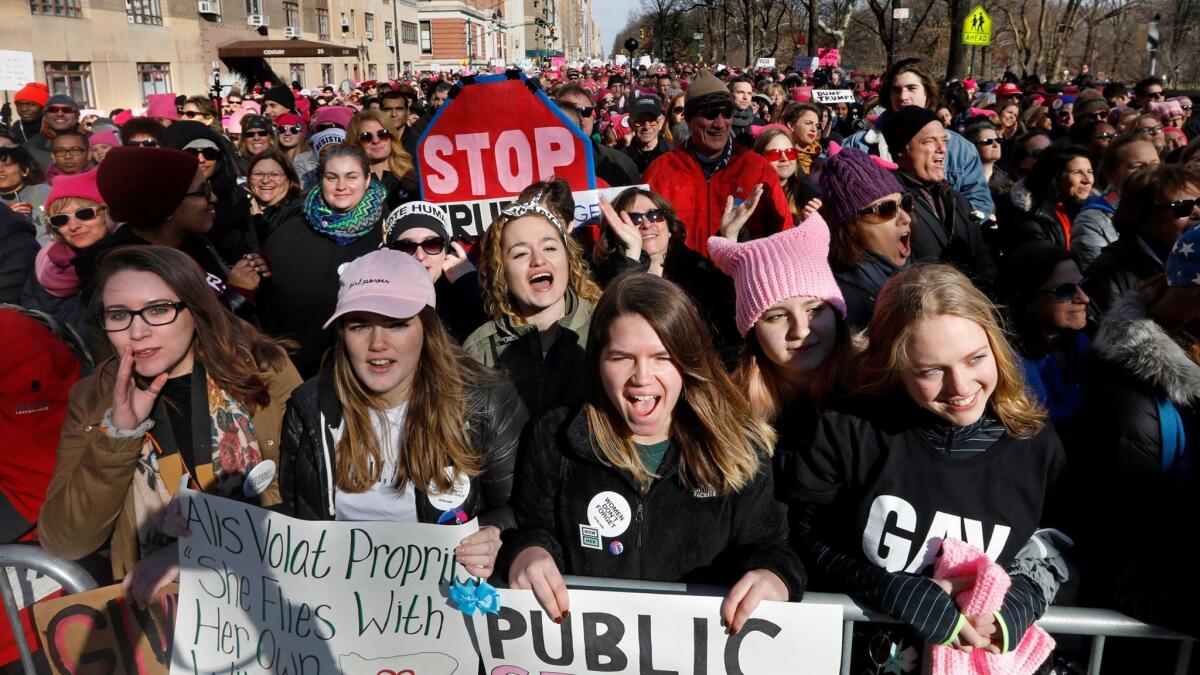
They came by themselves or in groups — with friends, parents and sometimes small children. Across the United States, thousands of demonstrators expressed their displeasure and dismay with President Trump and his administration. There were moments of anger, solidarity and even humor, along with heartbreaking testimonials.
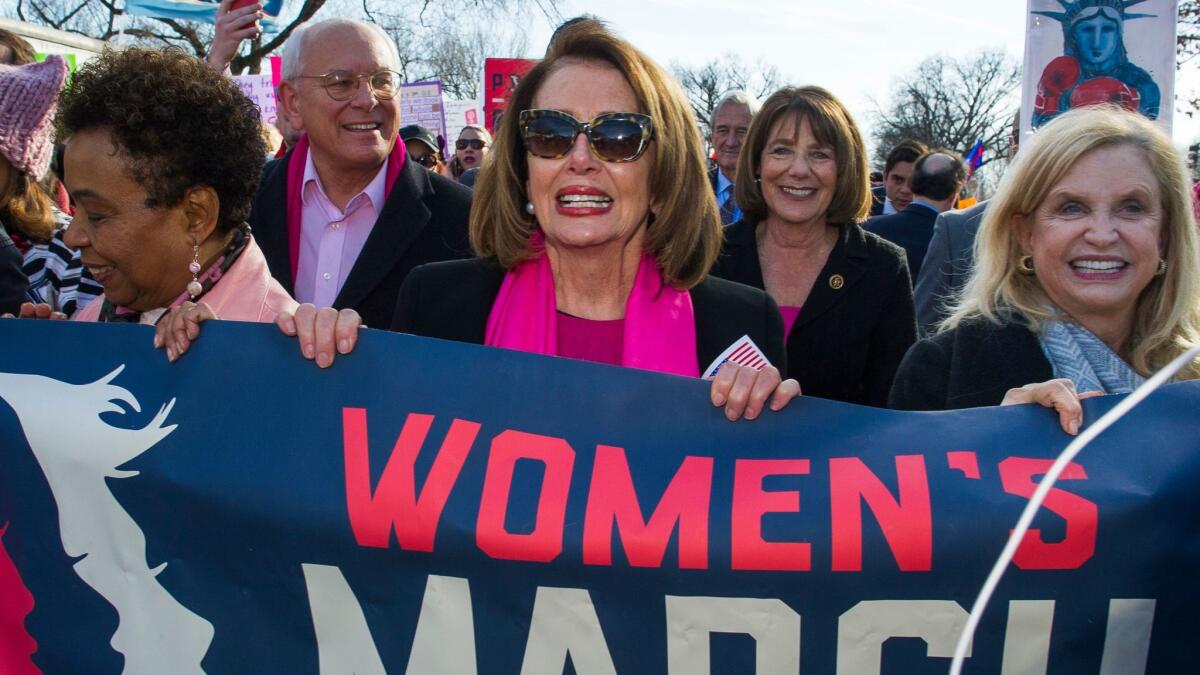
Washington
As thousands of marchers converged on Washington, organizers and participants alike said they felt no pressure to reprise the scale of last year’s enormous gathering, when the march in the nation’s capital was the focal point of a coast-to-coast outpouring.
“It’s good that this year, a lot of people are more active in their own hometowns,” said Ruby Steigerwald, a 57-year-old local teacher. Nearby, Kristn Yates, from the northern Virginia suburb of Fairfax, pushed a stroller with her 2-year-old granddaughter, Isabel, fast asleep beneath a pink knitted hat and a sign labeling her a future voter.
An early-afternoon tweet from Trump hailing the nationwide gatherings drew groans and guffaws from marchers who saw it pop up on their phones.
On Twitter, the president called it a “perfect day for all Women to March,” implying that those taking part were celebrating his administration’s accomplishments. “Well, we’ll celebrate when…,” said an elegant gray-haired women, before expressing an unprintable wish for his departure from the scene.
Washington’s ever-enterprising vendors were out in force on the main approach routes, selling march-themed T-shirts, buttons and pink caps. One marcher carried a 3-foot-tall Trump papier-mache figure — “I didn’t make it, I bought it!’ she said.
A T-shirt seller tailored his sales pitch with a nod to the diversity of the crowd. “All sizes and colors!” he shouted. “Just like you!”
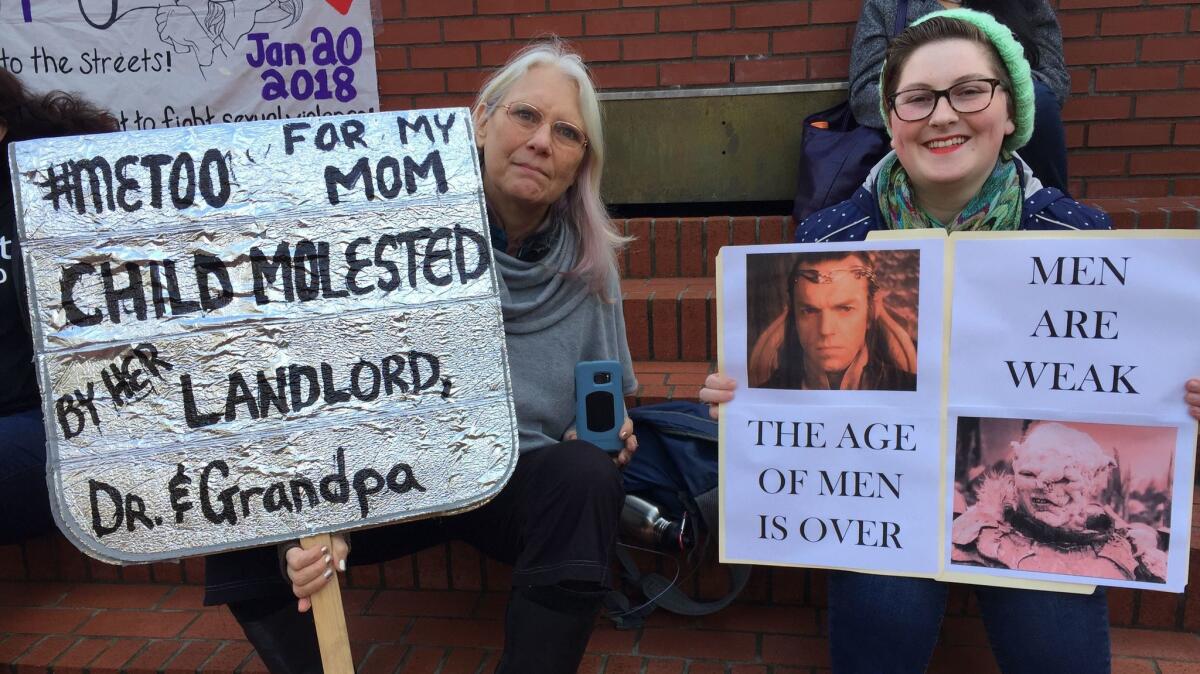
Oregon
Tess Carter's devastatingly simple words about surviving sexual violence were carried by a tiny battery-powered amplifier that couldn't quite overcome the sounds of thousands marching and chanting in a separate rally a block away.
"I was raped, multiple times, by a man in my socialist organization," Carter said. Her story was among more than a dozen shared by survivors of sexual violence at the #MeToo rally in Pioneer Courthouse Square in downtown Portland. It was one of four protests in Portland on Saturday.
Swear words were ubiquitous, ,and probably will also be at the Indigenous Womxn's March on Sunday. The anger in the air was palpable.
"Smash the patriarchy!" one woman screamed.
Another, Violet Trachtenberg, held a sign reading "Men are weak / The Age of Men is over."
"When women's bodies are under attack, what do we do?" yelled Olivia Pace, the emcee with Socialist Alternative, which organized the event.
"Stand up like that!" the crowd yelled in unison.
The most moving moments -- heartbreaking and powerful – came when Carter and other women who said they had endured sexual abuse told their #MeToo stories.
Women young and old spoke about "rape culture," slut shaming and the silencing and ignoring of victims of sex crimes. The testimonies riveted everyone present. Voices trembled and shook, as the speakers addressed several hundred people and media, including TV cameras. "I was a virgin," one young woman said, after sharing the story of her date rape as a teenager. "He waited until I stopped shaking to take me home."
"When I was 17, I was date raped by a guy I was barely dating," another said.
"Today my body is my protest sign," one woman said. She went on to detail how she survived sexual assaults by her father starting at age 13, and how a patriarchal system's response — including reconciliation therapy and a male police officer interviewing her "in a small, confined room" — hardly made things better.
Her father, she continued, "attended last year's Women's March with his gender studies professor girlfriend."
New York
Ellie Johnson, 18, marched with friends who are studying musical theater. She held a handmade sign with a Dr. Seuss-like illustration and the message, “I do not like you down my shirt. I do not like you up my skirt. I do not like you near my rump. I do not like you, Mr. Trump.”
Johnson said she was marching to honor her mother, who became a scientist despite being the only girl in her science class in college. Her friend Elita Ernsteen echoed that story, describing how her mother had to fight to join an all-boys softball team when she was growing up.
“We’re very much still fighting the fight that our mothers fought,” said Miranda Blood, 18.
Immigration was another strong theme during the march in New York. Jinji Nicole made a sign that featured Lady Liberty and said, “I’m with her.”
“What stood out in the harbor all these years welcoming immigrants was a woman,” Nicole said. “They were trying to tell us even then that we would be the ones to take America in the direction it’s supposed to go.”
Many demonstrators expressed their support for immigrants through signs. Some read “Stop separating families” and “Everyone belongs here.” Another read “Leave my halal guy alone,” a reference to the many bodegas and delis managed by Yemenis and other Muslims affected by the president’s travel ban on refugees from mostly Muslim countries.
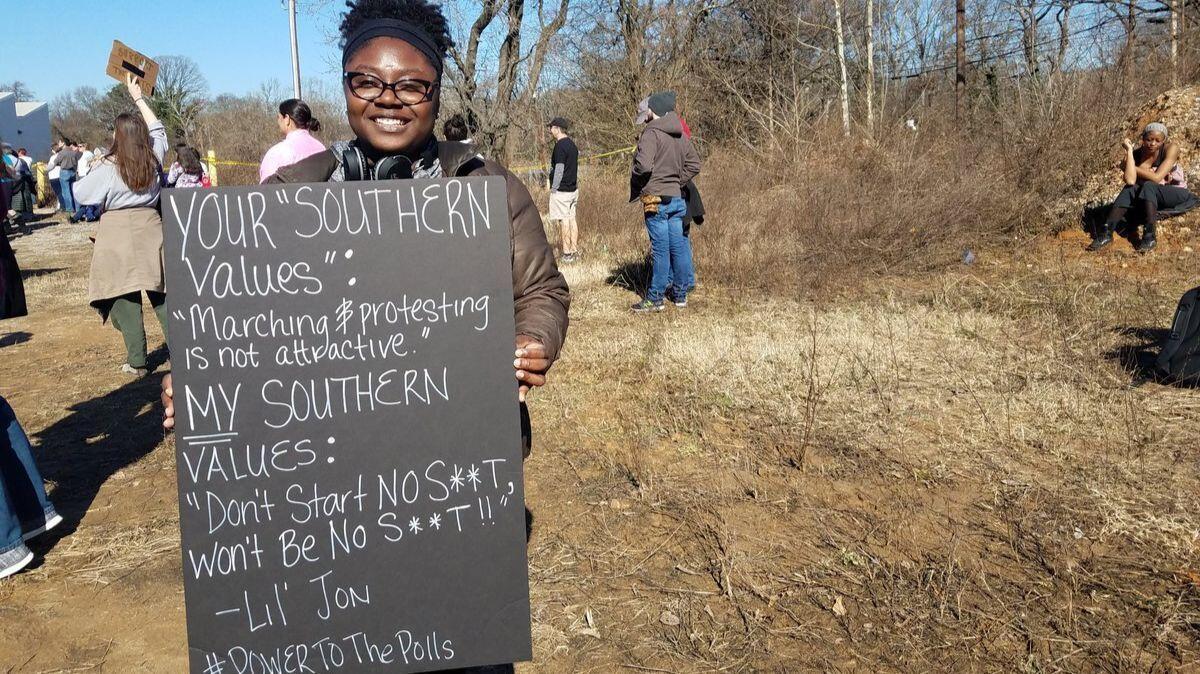
Georgia
It was part political pep rally, part disco, part voter registration drive.
Holding signs that said “RESIST” and “STAY NASTY,” thousands of women — and some men — gathered at a squat, brightly painted warehouse in southwest Atlanta the event called Power to the Polls.
“Our country is so much bigger and kinder than one man in the White House,” Alyssa Milano, the actress whose #metoo tweet started an outpouring from women on harassment and abuse, told the crowd to loud cheers. “The real power is not with him. It is with you. Dare everyone you’ve ever met to go register and vote.”
The mood was upbeat, even triumphant, as a sound system pumped out soul and disco hits from Aretha Franklin’s “Respect” to Patti LaBelle’s “Lady Marmalade.”
Women said they had come not simply to commiserate about Trump’s first year in office. They were celebrating a year of burgeoning activism and committing to winning more elections in this deeply conservative state.
“Last year we marched, this year we organized,” Milia Akkouris, a 39-year-old flight attendant from Atlanta said as she carried a “Grab ‘em by the vote” sign into the warehouse to look at booths from scores of social justice groups.
Since Trump’s inauguration, Akkouris said, she had spent days off attending legislative sessions at the Georgia State Capitol and phoning and emailing her elected officials. Now she planned to speak to volunteers about canvassing for Stacey Abrams, a Democrat hoping to become Georgia's first black female governor.
“Historically, liberals and progressives have been lazy getting to the polls,” she said. “But a lot is at stake. We have to ask ourselves: What are we doing about it?”
Texas
Last year, after she attended the Women’s March in Austin that drew more than 50,000, Lorrie Hammons vowed to take part in more local protests, not just for women’s rights, but for other causes she would like to see get more attention in Texas, including Black Lives Matter. And so on Saturday, she was marching again, this time in Dallas.
“Texas is a very conservative state, but the metropolitan areas are more liberal,” she said. “I’m hoping. We need to make it great for everyone,” she said. She carried a sign that said, “It’s not locker room talk, it is sexual assault.”
“My daughter is 15, and it’s really important that things change for her. I’ve had sexual harassment in my career, and that needs to change,” said Hammons, 51, who works at REI.
Standing nearby were students from historically conservative Southern Methodist University, toting signs with a rainbow LGBTQ rights messages and a quote from famed activist Angela Davis: “I am no longer accepting the things I cannot change.”
Student Audrey Ngo, 20, said she came to protest not just sexism but the racism she feels on a daily basis.
“There’s so many micro-agressions here, it’s almost a part of Texas culture,” said Ngo, who is Vietnamese American. “There is too much complacency.… We’re just here to demand dignity.”
Walking beside the student group was Leslie Alcala, who came to the protest with her daughters — who wore “Equality” T-shirts — and her 2-year-old grandson, whose shirt said “Feminist.”
Just as Alcala was saying part of the reason she came was to defend a woman’s right to choose, a man cruised by on a bicycle, probably headed to an antiabortion march nearby. “Stop the hate! Vote Republican!” he shouted, adding, “You wouldn’t have the baby if you didn’t open your legs.”
Alcala sighed.
“Ever since Trump went into office, people feel they can be more racist and misogynist,” she said.
She went back to marching, noting the large number of men and families in the crowd.
“It’s about coming together,” she said.
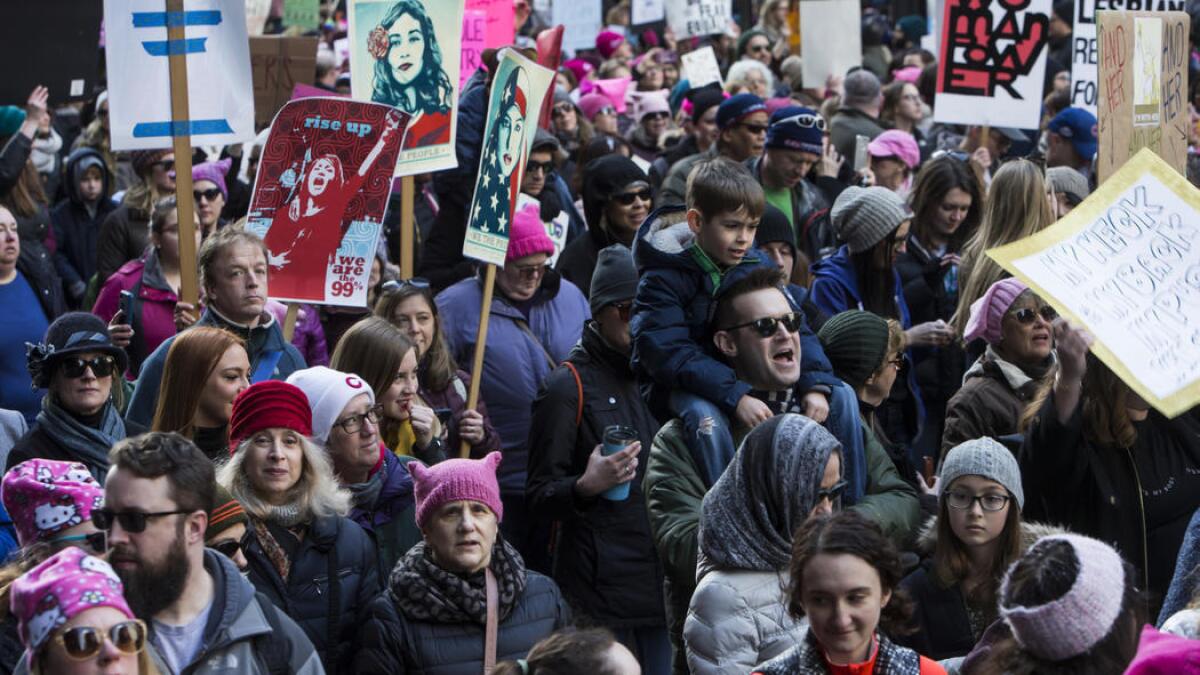
Illinois
For many demonstrators, Saturday’s marches were intergenerational affairs. "I'm out here for my daughter and myself," said Vikki Ford during the march in Chicago. She and her daughter Christina, 27, didn't go to the March last year, but after Trump's first year in office, a year they considered politically tumultuous, they believed they had to participate.
As the Chicago Tribune reported, Ford was among thousands who took to the streets in Chicago. Among them was Sandra Whitmore, who attended her first protest in 1968. Then 30, she joined others in San Francisco to publicly burn their bras. The experience was so intoxicating, Whitmore said, that she's attended dozens of protests in the five decades since.
She’s now 80 and a mother of four. All marched on Saturday. Her sign read: "My arms are getting tired from hold'n this sign since the 1960s."
Contributing were Laura King in Washington, Thacher Schmid in Portland, Ore., Nina Agrawal in New York, Molly Hennessy-Fiske in Dallas and Jenny Jarvie in Atlanta.
UPDATES:
8:10 p.m.: This articled was updated with a report from Portland, Ore.
This article was originally published at 5:25 p.m.
Start your day right
Sign up for Essential California for news, features and recommendations from the L.A. Times and beyond in your inbox six days a week.
You may occasionally receive promotional content from the Los Angeles Times.



